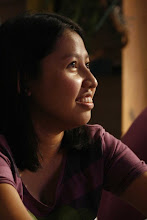I started the day with Charlie and the Chocolate Factory. “Again?” You ask. Yep, that’s how much I liked it. The night before, I saw Willy Wonka and the Chocolate Factory, the earlier release of Roald Dahl’s work. As much as I would love to compare the execution of both movies I feel like I shouldn’t. The key word is “technology.” The years in between 1971 (If I am getting the release years wrong, feel free to correct me.) and 2005 may explain why the earlier version could not afford an angle shot that would make the Wonka gate as grand as it is in today’s version, or why the 70s release had a limited set—the factory looked like a half-filled Wonka World whereas this millennium’s version was able to remove all traces of the real world inside Willy’s factory, or why Violet didn’t grow as big as she has today than years before, or why it was summer in the old movie (What was Charlie’s family thinking giving him a red scarf on a summer?) and it’s winter in the new, or why the Oompa Loompas look more identical today than they were in the past (May I clarify that CGI made that possible, not cloning—cloning is reserved for later), or why the TV set in the television room back then resembled a hollow black box and looked less realistic than today...the list may go on forever.
I haven’t read Roald Dahl’s work, well not yet. However, I assume that the 1971 release is the one more loyal to the original piece since Roald Dahl himself did its screenplay. However still, I’d say today’s screenplay was authored to fit today’s people. Aside from stepping on Roald Dahl’s artistic magic, I see no further problem there.
For both movies, I would like to commend the children who so very well played their parts. I keep on wondering if they really were acting and if they were, I wonder if they knew that they were acting.
On to Willy: Gene Wilder kind of confuses me. He’s playful then he’s serious, then he’s playful then he’s serious. I got the impression that he’s intermittently pulling himself out of the Willy character, thereby implying attacks of a multiple personality disorder. Johnny Depp presents an obliquely funnier Willy and remains consistent with being disturbed and childlike. Somewhere along watching the new movie, I thought that Jim Carrey would probably be the second best choice for Willy. Then again, he will most likely overdo the part and end up looking like a retard.
I’d like to note an observation. Willy Wonka and the Chocolate Factory bore “Willy” in its title but focused more on Charlie whereas Charlie and the Chocolate Factory carried Charlie in its title but did mostly an expose on Willy’s personality. Was this the filmmakers’ way of balancing the importance of their characters? I wonder.
Willy seemed to have ended too easily, “pack the major characters inside the glass elevator then roll in the credits; we’re done!” Charlie tried not to end too easily, “we still have a few minutes to go; let’s bring the glass elevator to a quick detour.”
I have to reiterate that I haven’t read the original story. If I do read it maybe I’d be able to back up my speculations and prematurely formulated opinions. I’ll abandon the factory for now.
* * *
I said I would lay off the factory but I didn’t say I’ll leave Johnny Depp and Tim Burton altogether. My next dose of Hollywood for today is Edward Scissor Hands. The movie caused me flashbacks; I couldn’t help it. I saw Edward Scissor Hands around fifteen years ago. It sort of brought back a morsel of my childhood.
Then I began using my brain again. Edward Scissor Hands displays Tim Burton’s penchant for visual spectacle—the one we saw in Batman, Big Fish, and of course, Charlie and the Chocolate Factory. On the other hand, with this film Johnny Depp celebrates his forte—playing the weird one.
Another observation: I noticed that Johnny Depp almost always looks pale. He appeared to be anemic even in Sleepy Hollow and in the Nick of Time. I think the only movie where I saw him in FULL color was in the Pirates of the Caribbean. Does he need blood transfusion or is he allergic to make up? Once again I wonder.
For those of you who have no idea what Edward Scissor Hands is all about, I’ll tell you this: it is a fairy tale that doesn’t end like a fairy tale.
* * *
To end my day I sat through Gattaca. My brother said that Gattaca requires a thinking audience (a comment I took as an insult) so I made sure I remained attentive for roughly two hours.
Gattaca is set in the not-too-distant future where GMOs have taken over natural life forms. Reality check: GMOs have taken over natural life forms today. Check the supermarkets. Now here’s a set back of watching a movie years after its release!
Cease the side comments.
Gattaca explores a world where Genetically Mutated Organisms (GMOs) reign superior over natural borns—this is in the context of human beings (not limited to food unlike what is happening today). It discusses the implications of cloning and human beings’ attempt to produce the perfect race. Of course the idea of a perfect race may sound unattainable for us today, but who knows how things may turn out a few years from now? I continue to wonder.
For a bedtime movie, Gattaca is a bit disturbing. It touches issues on family; genocism (think racism based on genetics); corporate politics; red tape; migration; relationships—or more accurately, choosing a mate; human beings’ insatiable thirst for success; and other matters that are impossible to resolve—plus Jude Law incinerates himself in the end.
Saturday, August 20, 2005
Filmfest
at
1:50 AM
![]() compartments
From the Couch Potato
compartments
From the Couch Potato
Subscribe to:
Post Comments (Atom)
















No comments:
Post a Comment